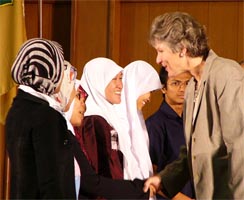Over the last week in Congress the effort to dramatically expand the State Children's Health Insurance Program hit another roadblock, several media reports on controversial earmarks were released, two members of Congress announced retirements and minor movement was seen on everything from an overhaul of the tax code to warrantless wiretapping and more Democratic investigations into Bush administration officials.
Following the president's veto of the expansion of the State Children's Health Insurance Program (SCHIP), the House last week passed a revised version designed to secure more votes from House Republicans. However, bill backers (almost all Democrats and a few dozen Republicans) failed to secure enough votes to override Bush's veto. This week, a bipartisan group of senators had been trying to find a compromise version of the bill with President Bush, but the deal broke apart on Thursday when Republicans forced a vote on the House version of the bill. The bill, while approved, fell 3 votes short of a veto-proof majority, leaving its future uncertain. Funding for SCHIP, which has already been extended past its Sept. 30 expiration, ends on Nov. 16, and the expansion bill's future is uncertain.
How did your senators and representatives vote? This week's featured participatory project is to record their votes in their "permanent record" - their Congresspedia profiles. No special knowledge or expertise is necessary and it only takes a few minutes. Full instructions can be found on the project page.
More details about the week in Congress are after the jump.
 The California wildfire press conference staged last month by Federal Emergency Management Agency (FEMA) staffers, who asked questions of their boss as though they were reporters, has claimed a second
The California wildfire press conference staged last month by Federal Emergency Management Agency (FEMA) staffers, who asked questions of their boss as though they were reporters, has claimed a second 

 U.S. Undersecretary of State for Public Diplomacy
U.S. Undersecretary of State for Public Diplomacy